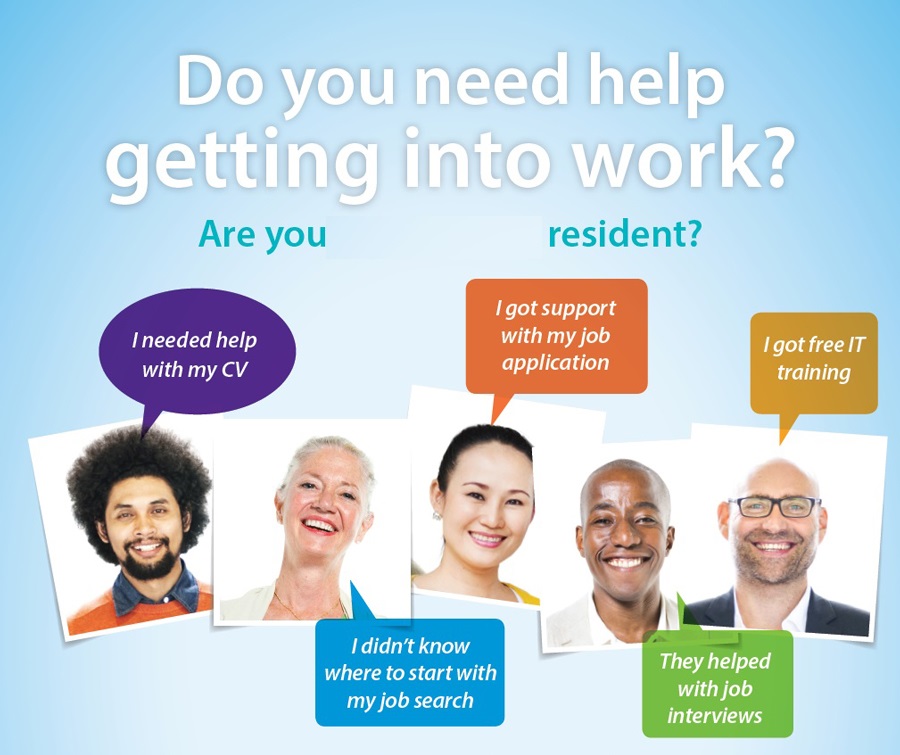By Dr Gaby Wolferink ![]() @drgabywolferink
@drgabywolferink

Many housing associations and local councils support, fund and run a variety of community groups in their localities. Among those groups are often Work Clubs, which are initiatives that support IT access and support for jobseekers who need help with the increasing digital nature of both the job seeking process and the administration surrounding welfare receipt. In this article I share some insights and theories from my PhD research that I conducted between 2013 and 2017 where I focused on digital exclusion and welfare reform as experienced in work clubs. The article concludes with some recommendations for those already running or supporting work clubs, or wanting to organise one. It might be a bit of a long read, I am very much aware of that, but it does bring together a lot of 3 years of PhD Research!
A Short History of the Work Club
The idea of the Work Club was born in the United States of America in the 1970s and developed by three behavioural scientists: Azrin, Flores and Kaplan. They proposed what they called the ‘Job Club Programme’ to see whether continuously guided and positive support from a Job Club instructor could lead to people obtaining jobs by changing certain job searching patterns and behaviours. In other words, the Job Club programme was a method, and the Job Club instructor a tool, to guide the behaviour of jobseekers; to shape their behaviour into something a ‘good citizen’ would do. The Job Club Programme was a highly organised method, with participants signing up to specific time commitments and structured meetings in which they were expected to share their experiences and progress with the instructor and other job seekers, aimed at creating accountability and support networks.
Despite the lack of further detailed research into the workings of them and what they actually contributed, work clubs became a staple community initiative in various forms, although the only formats that have ever received any focused attention from researchers, looking at their outcomes, were of the kind that adopted Azrin, Flores and Kaplan’s highly structured approach where participant job seekers signed up to take part in an actual programme.
The format that seems to be most popular, however, is the flexible, non-compulsory work club that we can see hosted in almost every neighbourhood centre across the country, especially in areas with high unemployment levels.
Work Clubs in the current socio-economic climate
The Department for Work and Pensions (DWP) and its Jobcentre Plus (JCP) are both very keen on the existence of, support for and job seekers attending work clubs. With JCP staff not being given the time they would like and need to support job seekers in-depth, individually, especially with navigating the increasingly digital world of job seeking and welfare receipt, job seekers are often signposted to work clubs. In 2013, the DWP wrote that work clubs are expected to “use local knowledge and resources to help unemployed people in their communities. They provide a place to meet and exchange skills, find opportunities, make contacts, share experiences and receive support to help them return to work.” In other words, the DWP and JCP are very happy to refer people to voluntary initiatives for support with a system and general practices that clearly aren’t one-size-fits-all. Is this fair? Shouldn’t it be clear that as soon as people need to defer to one of the many, and there are many, voluntary services to comply with their rules that their rules and expectations aren’t fit for purpose?
Theory and how it can help us make sense of Work Clubs and those running them
I would never recommend anyone to read (a direct translation of) Bourdieu’s work. It is not accessibly written at all and it takes the most dedicated and trained academic readers quite a bit of effort to work through his work. That doesn’t mean that his ideas aren’t worth discussing and using as a lens through which we can look at everyday practices. Luckily there are many academics who have based their work on Bourdieu’s original writings and that have made it a bit more accessible and with that more useful to help us think about society using some of his lenses.
One of Bourdieu’s helpful lenses through which to look at Work Clubs and volunteering in a Work Club is his theory of ‘symbolic power/violence’. In Bourdieu’s own words, symbolic violence is:
… the gentle, invisible form of violence, which is never recognised as such, and is not so much undergone as chosen, the violence of credit, confidence, obligation, personal loyalty, hospitality, gifts, gratitude, piety – in short, all the virtues honoured by the code of honour – cannot fail to be seen as the most economical mode of domination, i.e. the mode which best corresponds to the economy of the system (Bourdieu, 1977: 192).
See what I mean? Even writing it down again I had to read through it at least three times and still wondered how someone not knowing more of this would make sense of it, I know I didn’t when I started out with my PhD! Powell and Sang translated the above in the following:
“Symbolic power/violence is a form of violence that is not physical, but may take the form of people being denied resources, treated as inferior or being limited in terms of realistic aspirations” (Powell and Sang, 2015: 921).
They use fewer words, cruder words, but already give us an idea of what it means; people being denied resources. Despite them making it more accessible, they miss out highlighting one core element: the bit where it is ‘more chosen than undergone’. Society, including those who are suffering because of certain policies and decisions, actively choose to support these policies. They do so because these policies and decisions are all set in stories of personal responsibility and with that stories of people who do and don’t deserve support or respect based on that responsibility; stories of success and failure. Everybody wants to be seen as self-sufficient, because that means you will be considered deserving; as a success instead of a failure.
The entity that holds the most of this power to control policies, rules and the content and ‘lessons’ of these stories in our society is the State. This means that the State, or government, has the power to set out these policies and rules and impose them on people as ‘universally applicable’ and ‘true’, enforcing them through explicit and implicit practices. The explicit practices are the rules, policies and practices visible to everyone, the implicit practices can be found in the stories, in what we tell each other and ourselves about why the rules are like that, and how we should make sure we live by them.
This, of course, doesn’t mean that people can or will not reject or get angry at how they are treated, and that they will not (try to) defend themselves from harm or rectify misrepresentation. However, this defence often fits perfectly in the story that there are people who deserve and people who do not deserve compassion, respect or support. Those defending themselves or others will go on the offence by making sure they are seen, within the set-out rules and policies and stories that they are deserving, but that there are others who are not, and they are not like them; it is the Others that give, in this case unemployed individuals, a bad name. They want to work, it’s some Others that don’t and fit the tabloid image of the ‘welfare kings and queens’.
In short, the lens of symbolic violence is an important way of looking at and exploring how certain inequalities and oppressions are not just created, but also kept alive while they absolutely shouldn’t.
Experiences from volunteering in a Work Club
For my PhD research I spent 1.5 year volunteering in a Work Club, and have visited and shortly helped out at others across the area in which my research took place for shorter periods to compare. When people ask me about my research and experience ‘collecting data’, I think back of it with a fondness mixed with sadness and powerlessness. The fondness comes from the amazing people that I’ve met over the course of my research. Everyone was so welcoming, so open, so funny, so kind. Despite us coming from very different backgrounds, countries and being of very different generations, mostly, it was the most heart-warming professional experience I’ve ever had.
The emotions and experiences that I dealt with myself forced me to re-evaluate my own stance, my own presence and my own beliefs even more closely than anticipated. Instead of documenting my own presence to mitigate my ‘bias’, my own experiences appeared to become part of my data and research, and I myself became an even more active participant in my own study. Being present was no longer solely a requirement to collect data originating from other people; instead, slowly my presence in the Work Club felt more as volunteer than researcher, and I felt that I was sharing certain experiences of powerlessness and hopelessness with my clients. This allowed me to ask and answer volunteer-specific questions that could shed a light on the nature of unemployment and job searching practices as prescribed by the State and lived by both jobseekers and myself as a work club volunteer.
Many clients, especially when new to Banterby SC work club, walked in with a very insecure posture, not standing tall, not speaking up, and often looked at the ground, even when spoken to, as if they were feeling ashamed of the situation they were in, which was a clear example of ‘unemployment’ being inscribed onto the body, shaping their actions:
Often, I could see it in their eyes that they were at the end of their tether. I could see it in the way they sat behind the computer or stood near the coffee table. I could hear it in the way they spoke, and could just generally feel the overall feelings of desperation when people mentioned that yet again they had not heard anything after sending in an application, or had been to the JCP and had heard that they had not done enough to look for work. But more than that, they would often just tell me how hopeless they felt. They would tell me that they had no idea of what they could do to make things better, and that they had lost hope of finding employment, that they just did what they had to do not to get sanctioned, but otherwise had lost all hope of finding employment in the near future (Reflexive Writing, undated).
It was difficult to see people in such circumstances, and emotionally very difficult to deal with; to think of what to say, if anything, to make them feel better about themselves. But in the end, there was not much more I could do than to listen to them, and help try to do at least the minimum required.
One lady, Mel [fictional name], had found her way to Banterby SC work club feeling desperate about proving the Jobcentre that she was deserving of her Jobseekers Allowance, but found it difficult to deal with the digital nature of job searching, and making sure she logged everything so she could not be accused of ‘not doing enough’:
She thanked me for my help, looking quite relieved and a bit more relaxed. “It’s just put my head in a better place, you know, I had been crying my eyes out for the rest of the days this week…”, and there she went (again), she started crying and I didn’t really know what to say to her or do. I put my hand on her shoulder and comforted her a bit for as much as I could. I said she’d always be welcome here, if not to look for a job on that day, just to have a seat and a chat and a cuppa. She looked at me with a faint and grateful smile, and tried to stop her tears. “At least you’re not wearing mascara!” I tried to cheer her up a bit, which worked slightly. … She looked completely worn out, “They don’t want me anyway, I’m just an old bird…” she said still sobbing slightly. I told her it’d all be OK, but I knew that was just a thing you say… and she knew that too. (Field Notes, 27 January 2016)
She had clearly internalised the ideas and structures that hold that a good citizen is one that constantly proves their commitment to working or finding work when unemployed (Connolly and Healy, 2004), considering unemployment ‘a problem’, and herself responsible for solving it. Moments like these led me to suspecting that in the end, all that I, as a volunteer, was doing was performing volunteering. Even if I wanted to more than just be a statistic, a confirmation that people do still volunteer to help other people, there was not much more I felt I could do than to turn up and volunteer:
I go there and I help out where I can while at the same time knowing that what I’m doing at that very moment isn’t going to change the system, isn’t going to change the world. We’re teaching them to be compliant/how to work within the system, because we know that they (and even we) are powerless and cannot just decide not to go with the flow. Because if they don’t they’re sanctioned (Reflexive Writings, undated).
As a volunteer, partially because of the time constraints, I knew I could not make the difference I wanted to make when helping people. The most pressing problem that we had to address within the work club was not to get people sanctioned, instead of trying to helping people to find their way back into employment. Addressing this problem meant that we had to teach people how to operate within a welfare support system that did not work for them.
‘Powerless’ is the word I have used most to describe how I felt about volunteering within the work club, and ultimately, I found that through “thinking about … how I experienced … the powerlessness of not being able to adequately help my research participants, I am finding some possible answers to questions surrounding impact and possibilities of volunteering” (Reflexive Writing). When trying to help a man called Paddy looking for jobs that would both pay the rent and that he could actually get to using public transport (as he did not have the money to pay for a driving license, let alone a car), ‘powerlessness’ was, again, the main sentiment that Paddy and myself shared:
It makes you feel completely useless and powerless. Like every time, I come to Banterby SC work club, I want to help, I really, really do, and by listening to them and eventually writing about them I hope I can do so, but I cannot change reality, I cannot create hundreds or thousands of jobs, and I cannot give them the skills they do not have over night. I cannot change the way the Jobcentre Plus works, and I cannot change the digital system. I cannot prevent sanctions from being given out to the wrong people for the wrong reasons. I cannot, I cannot, I cannot. There is so much I cannot do… (Field notes, January 2016)
My encounter with Paddy was close to the end of the field work period, and I felt bad about feeling some relief at the idea that soon I would be exiting the field to write up my research. Soon I would not have to deal with these feelings of powerlessness so directly, facing people that in fact I would not be able to help, apart from helping them to conform to a system that mostly hurt them even more, and kept them away from regaining power over their own lives. I would not have to face them and tell them that at this point the only thing we could do was get some basic applications in so that they had something to show for at the Jobcentre, before going on with the next client for whom I would do exactly the same. I thought I would be free of feeling this guilt and powerlessness when I left the field, but reality appeared to be different.
I mainly look back on my time with Banterby SC work club as positive. The people, both from the organisation as well as its clients, were amazingly open and welcoming, and within such a sensitive environment where people were dealing with a lot of different problems I was amazed to find such a level of positivity, determination and solidarity. At the same time, however, as demonstrated above, it was also a time of frustration. This frustration keeps growing every day I write more about the field work in my thesis, analysing and interpreting my data. Where I had somehow expected it to get better after leaving the field, having collected all the data that I needed I had come to the realisation that what I did in the work club was hardly affecting the actual problems that needed fighting. Indeed, I found that over time my feelings of sadness and powerlessness only grew stronger, not for my own sake, but for that of my clients.
On the 22nd of June 2016 I went back to Banterby SC work club for the first time since January 2016.
All I could do, as a person, because I am a person above all this, above being a volunteer or even a researcher, is show him my disapproval for the way that he is being treated, by telling him that I find it abhorrent to put such immense pressure on people who clearly want the same thing that the Jobcentre wants: to get them back into employment. “It’s rubbish, isn’t it…?”, I tell them, “I cannot believe that this is how it’s supposed to go, someone should be able to see that this is not fair, not working??? This makes me so angry!” I did so this morning, without thinking, and I have done so on many occasions over the course of my fieldwork.
(Field notes, June 2016)
In explicitly telling them that I thought “it was rubbish”, I was being the volunteer that I would be without the research. This, for me, was an important realisation. I realised that if I, as a volunteer who was supposedly there to support the clients, was feeling as powerless as they did, that we were all set up to fail. I felt that there was, in fact, not much I could do to help them and that all we were trying to achieve was, in fact, not working.
Time to re-think how we organise and talk about Work Clubs
First of all, let me say that, even though I doubt I have that level of influence, I don’t want anyone to stop running or supporting a Work club because of what I have written above. It is, in my opinion, the system that is not working, and Work Clubs are operating within that system, partially mitigating the results of that system for those who visit the Work Clubs for help, and that is something that I consider absolutely necessary to keep as many people out of the sanction cycle as possible.
However, acknowledging the system is broken (or I’d settle for people agreeing that at least it is far from ideal) means that when thinking of ‘outcomes’ and ‘results’ for Work Clubs, we have to make a distinction between qualitative and quantitative outcomes and how we talk about and publish them.
If all we do with Work Club outcomes is focus on numbers through the door and jobs found regardless of their security, length of contract and pay we will perpetuate this broken system by saying ‘look at how well our Work Club(s) are working!’,
5 things you can do
The following 5 things that are easy to do and achieve but can make a major difference in how Work Clubs are perceived and used: Think of Work Clubs as Jobseeker Support Groups. When writing about Work Clubs in annual reports and inviting people to come and visit, please consider organising and advertising them as a ‘Jobseekers Support Group’, rather than one that adds extra stress and pressure onto people who are already under so much pressure from the welfare system.
1. Talk of more than just jobs when inviting people. Mention coffee and tea, a chat, a laugh and support on that same flyer.
Job searching can be a soul-destroying venture for many who try and find help in Work Clubs, especially now unemployment in more precarious jobs has risen significantly during the Covid19 pandemic. Attending a Work Club is often not the first choice and instead is deemed a last resort, or they are ‘highly encouraged’ to go by their JCP coaches, and might think that your Work Club is merely an extension of the place they dread going to. As I found myself looking for work over the last few months, I was once again reminded that looking for work goes a lot better when you’re in a more positive and self-appreciating mindset. Being stressed, anxious and sad doesn’t do you, your concentration and writing skills any good.
2. Don’t use stock photos you find when googling ‘smiling professionals’ for your flyers and reports.

Instead, ask if those attending the club are open to have their picture taken and shared in a way that shows those considering to go that there’s people like them there.
Normal, real people in a similar situation that they can relate to and have a cup of tea with. Or, to make sure people know it’s a place for support, pictures of that actual coffee corner and people having a laugh and a bit of banter.
3. Be honest and realistic to customers, yourself, your organisation and any potential funders about the people who come to you for help and what you can offer them with the often limited resources that you have.
Just searching randomly for Work Club flyers it is clear that most of them advertise for support with e-v-e-r-y-t-h-i-n-g, from interview training to CV writing and skills development. If that is indeed what you can offer because you have the available resources, great, but in many cases, as explained above, you will be helping people do the bare minimum. This is not because there is no motivation to do more from any party, but because often there’s not much more time available and a lot of people who come to you will need help with everything, from opening a browser and opening an email address and/or job website (or recovering a password from either or both) to writing cover letters, CVs and everything in between. There is no need for interview training if they can’t get out their CVs and applications to begin with.
4. Don’t just share the outcome-focused quantitative positives, but share the reality, which also includes the difficulties, the challenges and the set-backs when writing your press releases and annual reports.
Don’t just ask for that one quote from that one person that found a job after three visits accompanied by their smiling picture, but talk to the ‘regulars’, ask them about their experiences, bring in a professional photographer to take non-posed pictures (with consent!!). You will have regulars who will come every session that you run because it’s something that gives them a rhythm and human contact other than perhaps their partner or kids during the day. The fact that there are regulars not only shows you that Work Clubs aren’t a one stop shop for success, but also that you’ve created a space that people enjoy coming to, despite the difficult situation they find themselves in.
5. Listen to the people running and volunteering your work club to offer the right services in the right way
As I wrote in my experiences, I often felt as powerless as the people that I was trying to help, and being able to talk about this with the organisation that ran the work club massively helped. It can be depressing and taking a toll on your staff.
Listen to what your staff and volunteers say, offer support and work with them to offer services tailored to your clients, in that neighbourhood, in that community, especially if you’re new to or are thinking of setting up a Work Club. You won’t know what the most needed service is in your Work Club until you’ve run it for a while, and you won’t be able to just tell it from the number of people who came through the door or the surveys you ask people to complete. Go and have a look yourself in various up-and-running Work Clubs in your area, speak to volunteers and staff there and ask for advice. You won’t ever set up the perfect job-finding ‘solution’, but it might keep you from making mistakes or wrong assumptions and setting the wrong expectations that others have already overcome.
About the Author
Dr Gaby Wolferink is a co-founder of Social Housing Matters. She has worked in social housing since 2005, following in her mother’s footsteps. Her journey started in the Netherlands, and after a stint in academia that brought her from BA in English to MSc in Human geography to a PhD in Social Policy from Loughborough University focusing on welfare reform and digital exclusion, she decided that her place to make a difference was in social housing.
She is currently looking for a new challenge that will allow her to combine her passion for IT, digital transformation and customer-centred services with her talent for dot-joining and gap-identifying data trawling that leads to innovative and new ways of thinking.
References:
Azrin NH, Flores T and Kaplan SJ. (1975) Job-finding club: A group-assisted program for obtaining employment. Behaviour Research and Therapy 13: 17-27.
Bourdieu P. (1977) Outline of a theory of practice. Cambridge: Cambridge University Press.
Bourdieu P. (1991) Language and Symbolic Power. Cambridge: Polity.
Bourdieu P and Wacquant L. (1996) An Invitation to Reflexive Sociology. Cambridge: Polity.
Ludwig-Mayerhofer W and Behrend O. (2014) Enforcing Mobility: Spatial Mobility under the Regime of Activation. Mobilities 10: 326-343.
Powell A and Sang KJC. (2015) Everyday Experiences of Sexism in Male-dominated Professions: A Bourdieusian Perspective. Sociology 49: 919-936.



